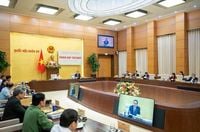Starting May 6, 2025, Vietnam is set to engage its citizens in a significant constitutional amendment process, officially releasing a draft resolution aimed at amending and supplementing several articles of the 2013 Constitution. This initiative seeks to gather public opinions and suggestions, with the collection period expected to conclude on June 5, 2025.
The announcement follows a pivotal meeting on May 5, where National Assembly Chairman Tran Thanh Man, who also heads the 2013 Constitution Amendment Committee, convened the committee for the first time. At this meeting, Hoang Thanh Tung, the Chairman of the National Assembly's Law and Judicial Committee, presented six essential documents related to the amendment process. These included the draft resolution for amending the Constitution and a plan for collecting public opinions.
During the meeting, Tran Thanh Man emphasized the urgency of updating the Constitution to provide a legal framework for necessary adjustments within the political system. He stated, "The amendment, supplementation, and improvement of legal documents of the 2013 Constitution is an urgent task that must be prioritized to lay the legal foundation for the adjustment of the political system." The committee members unanimously supported the documents presented, reflecting a shared commitment to a transparent and democratic amendment process.
As part of this innovative approach, public input will be solicited through various modern technologies. Deputy Phan Van Tuan from Nam Dinh province praised this method, stating that the approach should be diverse and flexible, integrating technology to enhance participation. He expressed hope that relevant departments would provide clear guidance to facilitate public engagement.
National Assembly delegates are largely in agreement that utilizing modern information technology in the opinion collection process will not only increase transparency but also improve the efficiency of gathering and analyzing public feedback. Deputy Tran Khanh Thu from the Thai Binh Provincial National Assembly Delegation remarked, "In the context of rapid technological advancement, we have every reason to employ advanced technology to solicit more public opinions. This not only aids in comprehensive opinion collection but also represents a progressive solution in the amendment process."
The draft resolution and accompanying documents will be made available on various platforms, including the government's electronic portal and the National Assembly's website, ensuring wide access for citizens to review the proposed changes and submit their feedback. This initiative marks a significant step in Vietnam's ongoing efforts to promote democratic engagement and responsiveness within its political framework.
Tran Thanh Man's call for a swift rollout of the public opinion collection plan underscores the government's commitment to prioritizing citizen involvement in governance. He instructed committee members to stay attuned to public sentiment and to guide the discourse effectively, ensuring that the voices of the people are heard and considered in the constitutional amendment process.
The combination of modern technology and a commitment to transparency is seen as a crucial element in fostering a more democratic atmosphere in Vietnam. With the public's feedback being integral to shaping the future of the Constitution, this process not only seeks to amend legal texts but also aims to enhance the relationship between the government and its citizens.
As the deadline for public input approaches, many citizens are eager to contribute their thoughts and suggestions on the proposed amendments. The expectation is that this process will not only lead to a more robust legal framework but also strengthen civic engagement and trust in the political system.
Overall, the initiative reflects a broader trend in Vietnam towards incorporating technology in governance and enhancing public participation in political processes. By actively seeking input on constitutional amendments, the government demonstrates its recognition of the importance of citizen involvement in shaping legislation that affects their lives.




